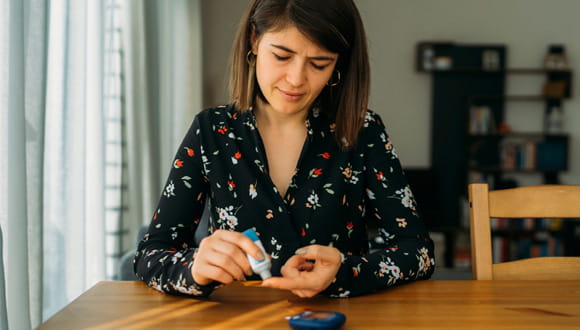Diabetes & COVID-19: 3 Ways to Protect Your Health
Aug. 6, 2020 - Katie McCallumAnyone can get infected with the new coronavirus that causes COVID-19, but some people are more vulnerable to severe illness than others — including people who have diabetes.
So while everyone should be social distancing, wearing a mask, washing hands and avoiding crowds, does being diabetic mean you need to take more precautions than someone who isn't high risk?
"It's always important to be sure that your diabetes is being well-managed, but, during the COVID-19 pandemic, it's even more important than usual," says Dr. Shivani Toma, endocrinologist at Houston Methodist. "The more uncontrolled your diabetes is, the higher the risk of developing more severe disease or complications from COVID-19."
This means that not only should you follow all of the universal precautions needed prevent the spread of COVID-19 if you're diabetic, but you'll also need to be sure to focus on carefully monitoring your blood sugar, as well as maintaining the healthy habits that help keep it under control.
Here are three ways to make sure your diabetes stays well-managed in order to limit your risk during the COVID-19 pandemic:
Continue to make healthy choices — even though you're stuck at home
The COVID-19 pandemic likely has you stuck at home more than usual, making it easier to snack more and move less — both of which can lead to climbing glucose levels.
"Any new lifestyle change or stressors can make managing diabetes more difficult, so now is an important time to take extra steps to help yourself stay on track," says Dr. Toma.
Tips for staying on track while you're stuck at home during the COVID-19 pandemic:
- Take your medications consistently and on time. Remembering to take medications or insulin may be even harder now that your entire routine is thrown out of whack. If you're struggling to keep up, set timers, leave your medication somewhere you see it often, or make it part of your meal schedule (if it's not already).
- Stay active. Gyms and fitness classes aren't as safe as they were before the pandemic began, so staying active right now is tough. But, it's still doable. To work in a workout, get outside for a walk or a run and do body weight exercises in your bedroom or living room. Since this virus is going to be among us for some time, you may even want to consider purchasing fitness equipment, like an exercise machine or light weights, if you can.
- Limit snacking. There's nothing like having extra time at home to help you sneak in a few extra baking projects here and there, or just a few extra trips to the kitchen for a snack. You'll want to avoid overindulging, but don't feel like you need to completely eliminate snacking and carbs altogether. However, you may want to avoid high-carb snacks as much as possible, since these can cause erratic blood sugar spikes that are hard to control.
Monitor your blood sugar closely
Self-monitoring and logging your blood glucose is an important part of the day-to-day management of diabetes you can easily do at home.
"Regularly monitoring your blood sugar will help you catch spikes or trends that suggest your diabetes may be getting out of control," explains Dr. Toma. "Because uncontrolled diabetes can put you at higher risk for a more severe case of COVID-19, it's important to reach out to your endocrinologist if your blood sugar seems out of control."
In addition, frequently checking your blood sugar can help you keeps tabs on how you're adjusting to the lifestyle changes that come along with this pandemic.
Don't skip checkups with your diabetes care team
Pandemic or not, regularly checking in with your diabetes care team is essential.
"Several factors can impact your glucose readings, and your blood sugar levels can change significantly in even as little as three months," says Dr. Toma. "Having your A1C levels checked every three to six months can provide your doctor with valuable information about how well-managed your diabetes is, as well as whether or not changes to your medications or lifestyle need to be made."
Don't avoid visiting your doctor's office for fear of catching COVID-19. You can rest assured that Houston Methodist doctor offices have the extra precautions in place needed to protect your health and see you safely, including:
- Screening all patients when scheduling appointments and upon arrival
- Wearing masks and other personal protective equipment while providing patient care
- Implementing enhanced cleaning and sanitizing processes to disinfect all equipment and surfaces
- Redesigning waiting rooms and check-in lines to ensure social distancing
Next Steps:
- Learn more about our diabetes specialists at Houston Methodist, who can help you effectively manage your diabetes
Concerned you may have COVID-19?
- If you're experiencing COVID-19 symptoms, you can speak to a Virtual Urgent Care provider 24/7. The provider will help you determine if testing is needed and advise you on where you should go.


